Rose talk
Winter is rose time. It’s a great time to plant new roses and the best time to prune and prepare for peak rose performance during the flowering season. Go Gardening talks to a couple of knowledgeable young gardeners about growing the worlds favourite flower.
Sally Brown of Blueskin Garden Centre and Cafe in Dunedin has a very busy life. But when she finds time away from her garden centre and work as a landscape architect she loves to spend time in her beloved garden. Sally loves flowers, and roses are an important part of the equation. “My garden is very resilient and I don’t get too obsessed with the processes” says Sally. “Like all gardeners I learn as I go. The important thing is to discover what works best for you, your soil and your climate.”
Hayden Foulds is the Junior Vice President of the New Zealand Rose Society and edits their publication ‘New Zealand Rose Review’. He also takes care of the NZRS website and Facebook page. He is involved with the NZRS International Rose Trials
in Palmerston North, and having attended rose conventions around the world, he still considers New Zealand the best country in the world to grow roses. Having just bought his first home in Woodville, near Palmerston North, Hayden
is looking forward to planting a garden blending roses and other garden plants.
Why do you grow roses?
Hayden: I grow roses because of the huge variety available in terms of types, colours, forms and how you can use them in your garden. There is always a rose for every situation in every garden big or small.
Sally: I never thought I would have so many roses in my garden! The main reason I find them irresistible is because I love having scented cut flowers to pick and their exceptional colour throughout summer.
Do you have a favourite type of rose?
Hayden: I like the floribunda roses because of the huge amount of blooms they produce over a season which creates a great show in the garden. Many floribundas are great for picking too.
Sally: David Austin (English) roses I just love their form, classic scents and unique colours.
What would you consider to be the most important thing you do to keep your roses healthy?
Hayden: For me its important to only grow those varieties that I find healthy and discard anything that isn’t up to the mark health wise. The other thing is feeding. Too often I see roses struggling just because they need some fertiliser.
Sally: I believe winter is a really important time for roses: pruning and preventative spraying with copper and oil, and feeding. I also feed them between flowering over the summer.
What do you feed your roses?
Hayden: I use ‘Sudden Impact for Roses’ which is available through rose societies. Applied in spring, summer and autumn, it’s easy to use and gives great results.
Sally: I always add slow release fertiliser at planting time and once a year I feed all my roses with Osmocote controlled release fertiliser.
What are the key pests and diseases affecting your roses and how do you minimise these problems?
Hayden: Rust is a big problem and one that is hard to control once it gets going. I avoid growing varieties that are susceptible to it. In a wet season like this summer, blackspot becomes an issue. I don’t spray my roses that much but one thing that helps to reduce disease is doing a winter clean up spray of copper and picking up fallen leaves around your roses. That little bit of work pays off with less disease problems in summer. As for pests, apart from the odd aphid which I leave to the birds to deal with, I don’t have many problems at all.
Sally: Black spot and aphids are the two main issues for me. I used to spray with Shield (a combination pesticide and fungicide) but these days I’m finding that Tui Rose Spray concentrate works well for me. I keep an eye out at and over spring and so i can get onto of things as soon as I spot the problem. I think the thorough clean up I do in winter helps a lot with disease prevention. And of course, a cold Dunedin winter can kill a lot of bugs!
When do you prune your roses?
Hayden: Anytime from mid-July onwards. I am never an early starter when it comes to pruning and it has to work around other commitments I have, plus the weather.
Sally: Late July but it really depends on the season. Sometimes it can be later.
Rose pruning can seem complicated to a beginner. What are some key things we need to know about this?
Hayden: Removing dead, diseased and damaged stems is a good first step when pruning roses. Don’t prune too hard either – take off no more than half the height of the rose. When done, give the bud union a light brush with a wire brush to remove dirt and bark that has built up as this encourages new shoots (basal shoots) to shoot away. And always remember, you can’t kill a rose by pruning it – anyone that does, deserves a medal so I say, just give it a go!
Sally: It can seem complicated but ask at your local garden centre. I am really tough on my roses. I cut them back really hard. Keep the plant open and cut back to outside buds.
What planting tips do you have for gardeners who are new to roses? Is replant disease an issue for you?
Hayden: Don’t let your roses dry out before and after you plant them, even in winter. Roses that are dehydrated don’t thrive at all. Prepare your soil in advance by adding compost and slow release fertiliser also helps give them a good start. If planting standard or weeping roses, invest in good solid stakes at planting time. If replanting roses into where roses have been before, I just add some compost and dig in well before planting the next rose and I have few problems doing it this way.
Sally: Plant what you like and be adventurous with colour choices. Also invest in some good garden gloves. I love my goatskin gloves to protect me from these pretty pricks!! Replant disease is not an issue with us.
How do you go about watering your roses?
Hayden: Fortunately in the Manawatu, we don’t have too problems with lack of water but if they do need a top up, I just go round with the hose and give each one a good soaking. That combined with a good layer of mulch usually sees them right for up to a week at a time.
Sally: Always hand water, either morning or evening.
How often do you apply mulch and what kind of mulch do you prefer?
Hayden: I apply mulch in the spring when the soil has warmed up and it is still moist. I prefer to use bark fines that have been well composted but will also use whatever I can lay my hands on at the time.
Sally: I have a large needy flower garden so give it a good helping of bark mulch once a year if it’s lucky! I am just in the process of doing this now.
What advice do you have for gardeners wanting to grow roses on challenging soils.
Hayden: Adding compost and gypsum helps break down heavy soils and improving drainage helps those that are prone to being water logged. Raised beds are also a great way of overcoming wet soils.
Sally: Roses are pretty tough and quite forgiving. If your soil is damp or heavy break it in first by planting other plants before getting stuck into roses. Adding lots of compost helps.
What other plants do you plant with your roses, or do you prefer dedicated rose beds?
Hayden: I used to grow roses in dedicated beds but with planning my new garden, I want to combine roses with other garden plants so there is colour and interest all year round. Some of my favourite plants I have seen with roses include Cosmos, Dianthus, Nigella, Delphinium and Clematis. Just pick your companions carefully and allow a bit of room for them to grow.
Sally: Everything thing goes in together. I especially love tall flowering perennials with roses; delphiniums, phlox, peony, achillea, foxglove, sage, and Potentilla are some of my favourites. I also plant spring bulbs such as Alliums and I make sure I have flowers in early spring before the roses come out. I also love geums, heuchera, meconopsis (blue poppies), and irises.
Winter Rose Care
- Prune roses while they are dormant in July or August.
- Use clean sharp secateurs. Flower Carpet Roses and other small leaf shrub roses can simply be pruned with hedge sheers.
- Cut on an angle, about 5mm above a bud facing in a direction you want the bush to grow. Angle the cut away from the bud to prevent water running into it.
- Wear gloves when pruning, preferably long ones to protect your arms.
- Clean away all leaf debris from under your roses. This is a refuge for pests and diseases.
- Spray after pruning with copper and oil to minimise disease problems in summer.

8-Jun-2017
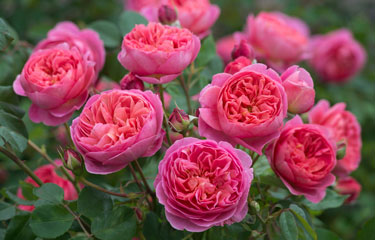
Rose 'Boscobel'
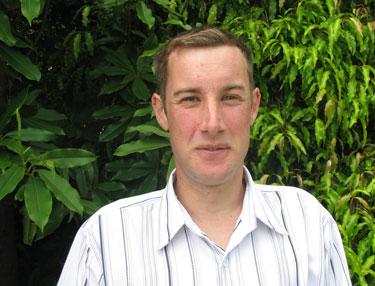
Hayden Foulds
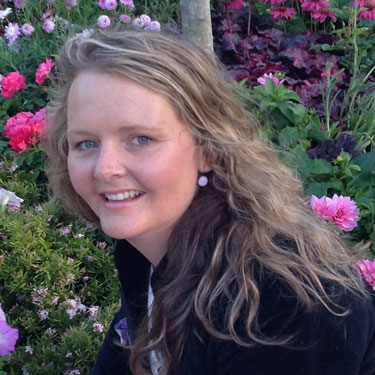
Sally Brown
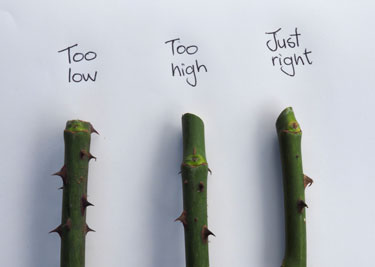
Rose pruning
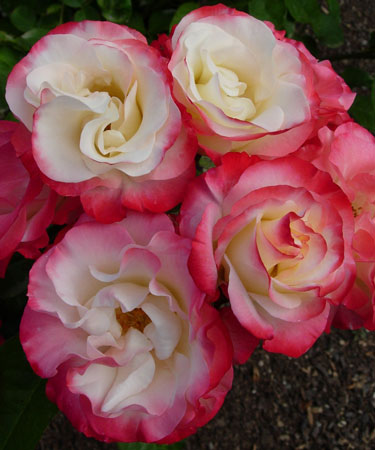
Rose 'Tropical Delight'
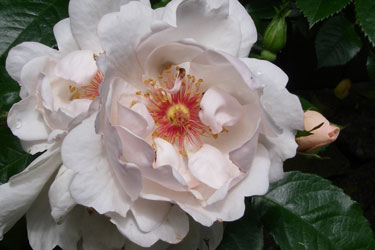
Rose 'Jacqueline du Pre'
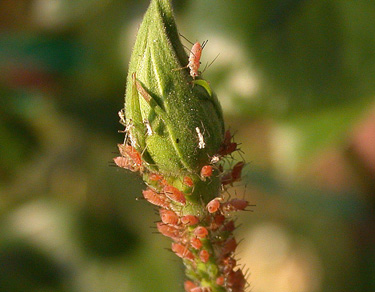
Rose aphids

